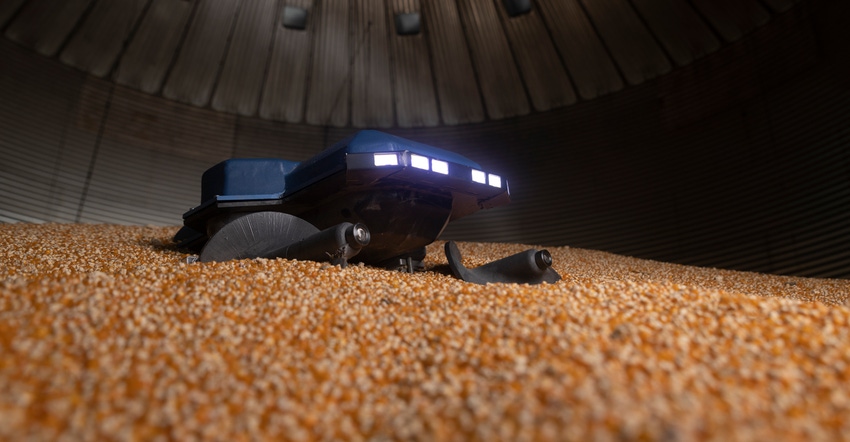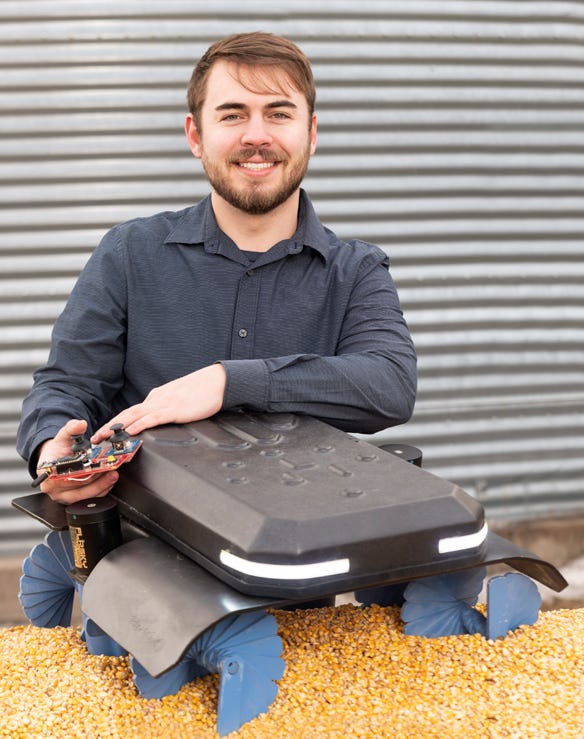
The idea came from a couple of farmers visiting after church about finding a way to stay out of grain bins. The result, after two years of tinkering and testing, is the new Grain Weevil.
This is not a grain-bin bug you need to worry about. It is a new 30-pound robot that helps level grain in the bin, to keep farmers from having to enter the bins. It can be transported by backpack, and it is waterproof and dustproof. If it gets buried in grain, it can dig itself out of up to 5 feet of grain.
Collaborative effort
Statistics show that grain-bin deaths spiked in 2019 and remained high in 2020. Any way to keep farmers and farmworkers from having to enter a bin will save lives. That’s why University of Nebraska-Omaha graduate Ben Johnson and his father, Chad, a farmer from Aurora, Neb., took on the idea.
Ben, as a UNO electrical engineering undergraduate student, built a robot for a startup in Chicago, so his knowledge was a springboard for this new project. Ben enlisted the expertise of his college roommate, Zane Zents, a computer engineering student from Omaha. Their efforts culminated in March 2020 when they were able to successfully drive their new small auger-driven mobile robot on the surface of the grain for the first time.
The friend who encouraged Chad and Ben to build the robot was Zach Hunnicutt. “While the conversation started due to a half-joking request to make my work easier,” Hunnicutt says,” it quickly evolved into discussing grain-bin safety and grain-quality management.”
Over the course of the testing period, the Hunnicutt farm became a sounding board and testing grounds for the Grain Weevil, with Zach offering ideas about what to try, as well as space to test it in real-world conditions.
“We are not commercially available yet,” Chad Johnson says. “We are starting six on-farm trials to put the technology through hundreds of hours of tests to make sure it is ready for farmers to use safely. We have not finalized the cost of the Grain Weevil yet, but we have a general idea and a target of under $4,000 per unit. However, there are many factors still at play for the final price.”

Ben Johnson developed the Grain Weevil with his father, Chad Johnson, and his college roommate, Zane Zents, a computer engineering major.
The company they have formed also plans a service subscription that will include advanced features, updates and maintenance.
The development process has had challenges. “We are now on our 12th iteration,” Chad explains. “One of the most challenging tasks is generating enough power to drive the augers through the grain, but keeping enough speed so that the robot can maneuver on the flow that it is causing. This is only possible with newer, brushless-motor technology and battery breakthroughs that give us the power, but are still light enough to handle.”
Replacing manual labor
The idea for the project started out with safety in mind, but it has evolved over time to be something much more. In addition to breaking up crusts and bridges in the grain bin, research and testing has demonstrated the Grain Weevil’s ability to help manage grain while farmers are loading the bin, while grain is in storage and while grain is being extracted.
“Each phase has tasks that the robot can either make more efficient or eliminate manual labor,” Chad says. “Our mission is still focused on keeping the farmer out of the bin, but maintaining the quality of stored grain adds tremendous value on the business side as well.”
“This project is important primarily because it has the potential to greatly reduce the risk of physical harm to farmers in one of the most dangerous jobs on the farm,” Hunnicutt adds. “In addition to being a dirty and fairly miserable job, the short-term and long-term health impacts can be life changing. Everyone has a story about a family member or friend who has been hurt or killed in a grain bin. But this also adds another tool to maintain grain quality in a way that is truly unique.”
The company believes its robot can do many of the tasks usually done by a farmer with a shovel. “We also get farmers that challenge us and make us really think through how the robot can be the most useful,” Chad says. “We are very thankful that most of the farmers we have talked to are willing to dig in and help us figure things out. They want this tool to be useful, and so do we.”
“If I can have a robot in my bins doing a job that I don’t want to do better than I can do it, that’s really a no-brainer,” Hunnicutt adds.
Learn more online at grainweevil.com.
About the Author(s)
You May Also Like






